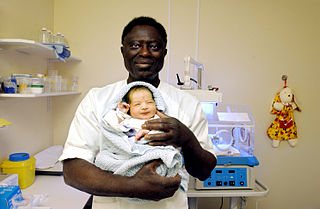Related Research Articles

A gender role, also known as a sex role, is a social role encompassing a range of behaviors and attitudes that are generally considered acceptable, appropriate, or desirable for a person based on that person's biological or perceived sex. Gender roles are usually centered on conceptions of masculinity and femininity, although there are exceptions and variations. The specifics regarding these gendered expectations may vary substantially among cultures, while other characteristics may be common throughout a range of cultures. There is ongoing debate as to what extent gender roles and their variations are biologically determined, and to what extent they are socially constructed.

Masculinity is a set of attributes, behaviors, and roles associated with boys and men. Although masculinity is socially constructed, research indicates that some behaviors considered masculine are biologically influenced. To what extent masculinity is biologically or socially influenced is subject to debate. It is distinct from the definition of the biological male sex, as both males and females can exhibit masculine traits.

A glass ceiling is a metaphor used to represent an invisible barrier that prevents a given demographic from rising beyond a certain level in a hierarchy.
The glass cliff is the phenomenon of women in leadership roles, such as executives in the corporate world and female political election candidates, being likelier than men to achieve leadership roles during periods of crisis or downturn, when the chance of failure is highest.

The Experiment was a documentary series broadcast on BBC television in 2002 produced by Steve Reicher and Alex Haslam in which 15 men are randomly selected to be either "prisoner" or guard, contained in a simulated prison over an eight-day period. "The BBC Prison Study explores the social and psychological consequences of putting people in groups of unequal power. It examines when people accept inequality and when they challenge it". The documentary presented the findings of what subsequently became known as the BBC Prison Study.
S. Alexander (Alex) Haslam is a professor of psychology and ARC Australian Laureate Fellow in the School of Psychology at the University of Queensland.
Social identity is the portion of an individual's self-concept derived from perceived membership in a relevant social group.
Stephen David Reicher is a Professor of Social Psychology at the University of St Andrews. He was formerly head of the School of Psychology.
Feminist psychology is a form of psychology centered on social structures and gender. Feminist psychology critiques historical psychological research as done from a male perspective with the view that males are the norm. Feminist psychology is oriented on the values and principles of feminism.

Rolf van Dick is a social psychologist in Germany.
Stacy Blake-Beard has a BS in Psychology from the University of Maryland, an MA and a Ph.D. in organizational psychology from the University of Michigan. Since 2002, Blake-Beard has been teaching organizational behavior at the Simmons College School of Management and is currently a tenured Professor of Management. Before Blake-Beard joined Simmons, she was Assistant Professor of Administration, Planning, and Social Policy at the Harvard University Graduate School of Education. At HGSE she lectured on organizational behavior, cultural diversity in organizations, and mentoring relationships at work.
The stereotype fit hypothesis suggests that group members will experience discrimination in different social roles or positions to the extent that their group stereotypically does not have characteristics associated with success in the position. For instance, women may not be considered a good fit for a managerial position if being aggressive is seen as a characteristic of a successful manager. Due to stereotype fit, men may be considered more qualified for the position and are not only more likely to be hired, but are also more likely to be promoted as well.
Within social psychology self-stereotyping is a process described as part of social identity theory (SIT) and, more specifically, self-categorization theory (SCT). Self-stereotyping occurs when an individual integrates commonly held characterizations of an in-group into their self-concept.
Research has examined whether or not there are sex differences in leadership, and these differences can be seen from a relationship based or task based perspective. Leadership is the process through which an individual guides and motivates a group towards the achievement of common goals. In studies that found a gender difference, women adopted participative styles of leadership and were more transformational leaders than men. Other studies that found no significant gender differences in leadership exist.
Women in positions of power are women who hold an occupation that gives them great authority, influence, and/or responsibility. Historically, power has been distributed among the sexes disparately. Power and powerful positions have most often been associated with men as opposed to women. As gender equality increases, women hold more and more powerful positions due to policy and social reform.

Kay Deaux is an American social psychologist known for her pioneering research on immigration and feminist identity. Deaux is Distinguished Professor Emerita at the Department of Psychology at the Graduate Center of the City University of New York (CUNY). According to Brenda Major, Deaux's work centers on the question of how social categories affect one's psychological makeup, social behavior, and life outcomes, while emphasizing the subjectivity of people's identities and experiences and the larger social context.
The term "glass escalator" was introduced by Christine L. Williams in her article "The Glass Escalator: Hidden Advantages for Men in the "Female" Professions" published in August 1992. The glass escalator refers to the way men, namely heterosexual white men, are put on a fast track to advanced positions when entering primarily female-dominated professions. It is most present in "pink collar" professions, such as those in hands-on healthcare work or school teaching. Feminized care professions often pay lower wages than stereotypically male professions, but males experience a phenomenon in which they earn higher wages and have faster career mobility when they enter feminine careers. This idea is akin to the more well-known idea of the glass ceiling, which explains the reality that women face when they fail to advance in the workplace. However, it has been found that men of color, and ethnic backgrounds do not reap the same benefits of the glass escalator as men in this majority.
Lisa Bowleg is a social psychologist known for her work on intersectionality and research focusing on the influence of social context on stress, resilience, and HIV risk among African-American and Latinx men and women. Bowleg is Professor of Psychology at George Washington University and the Director of the Social and Behavioral Sciences Core of the DC-Center for AIDS Research.
Michelle Penelope King is a white South African born journalist, writer, women's rights activist and advocate for gender equality. Since December 2019, King has been director of inclusion at Netflix, a department responsible for inclusion and diversity among corporate employees.
Rhoda K. Unger (1939-2019) was a feminist psychologist known for her position on the forefront of female activism in psychology. Unger was strongly committed to promoting social justice within society and women in science. She was a professor of psychology at Montclair State College for almost thirty years and was granted the status of Professor Emerita in 1999. After her retirement, Unger was a resident scholar at the Women's Studies Research Center at Brandeis University.
References
- ↑ Ryan, Michelle (August 2003). "A gendered self or a gendered context? A social identity approach to gender differences" (PDF). ANU Open Research Repository. Retrieved 3 February 2020.
- 1 2 "Prof Michelle Ryan Staff Profile". University of Exeter, Psychology. Retrieved 3 February 2020.
- ↑ Ryan, Michelle; Haslam, Alexander (2005). ""The Glass Cliff: Evidence that Women are Over-Represented in Precarious Leadership Positions"". British Journal of Management. 16 (2): 81–90 – via doi:10.1111/j.1467-8551.2005.00433.x.
- ↑ Thompson, Clive (12 December 2008). "New York Times: Annual Year in Ideas". New York Times Magazine. Retrieved 3 February 2020.
- ↑ "Word of the Year 2016 – Shortlist". Oxford Languages. Retrieved 3 February 2020.
- ↑ Üskül, Ayşe; Ryan, Michelle (Spring 2019). "Time out!". The British Academy Review, No. 35. The British Academy. Retrieved 3 February 2020.
- ↑ "University of Exeter Doctoral College brochure". University of Exeter. Retrieved 3 February 2020.
- ↑ "ERC Funded Projects (CIC)". European Research Council. Retrieved 3 February 2020.
- ↑ "Leading light on women's leadership joins ANU". Australian National University. 4 February 2021. Retrieved 4 February 2021.
| | This biography of an Australian academic is a stub. You can help Wikipedia by expanding it. |
